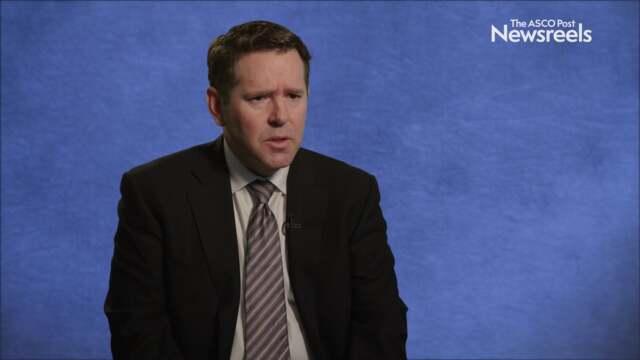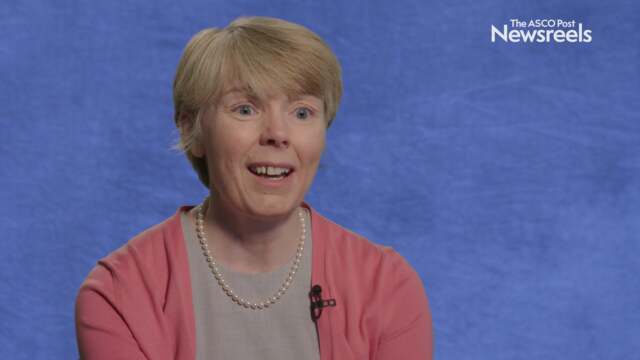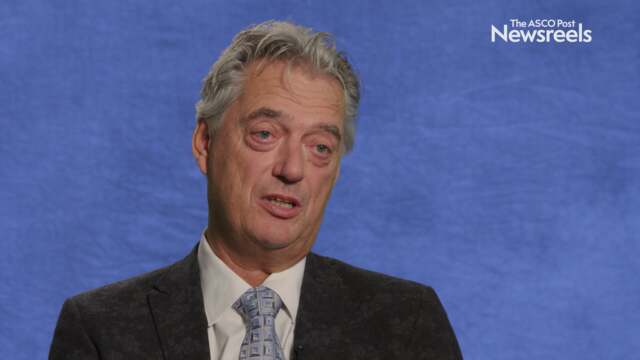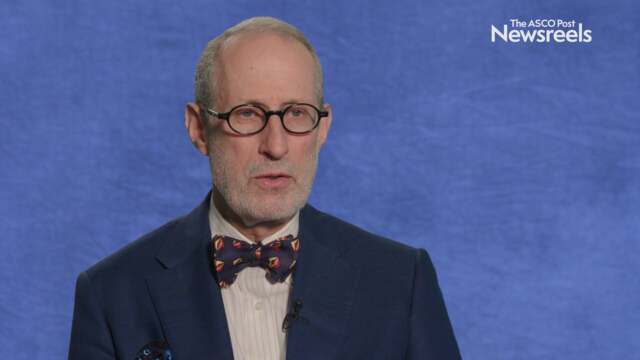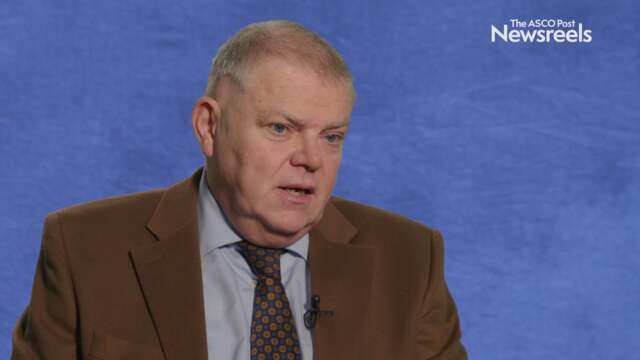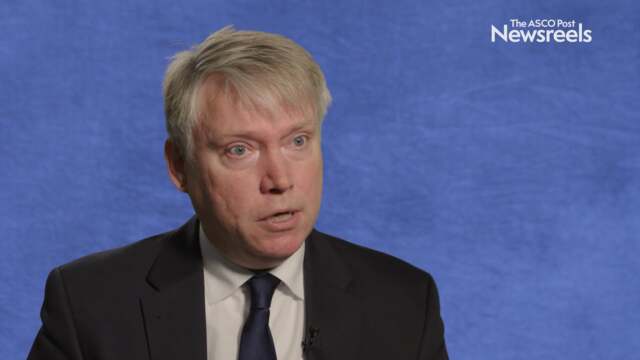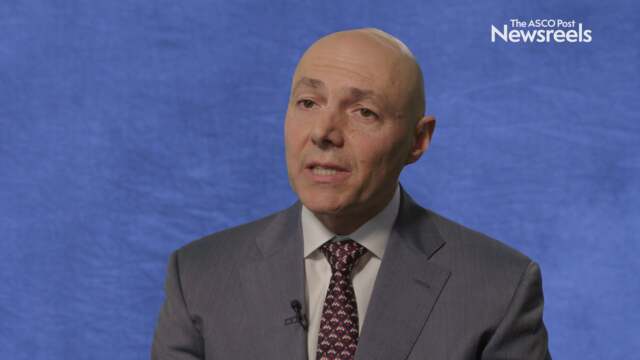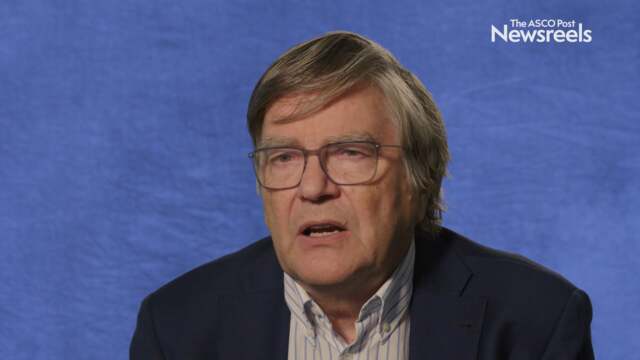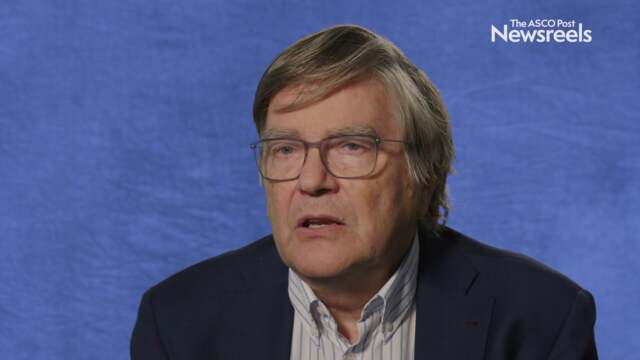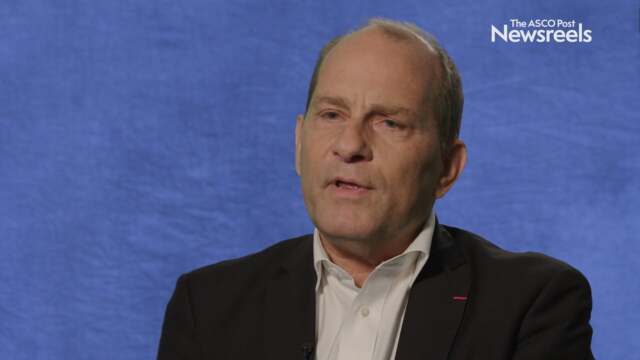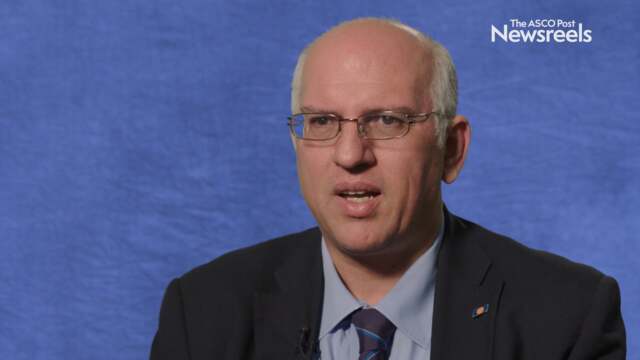ESMO 2018 Congress
Karl Lewis, MD, on Basal Cell Carcinoma: An Ongoing Study
Karl Lewis, MD, of the University of Colorado, discusses a phase II study of cemiplimab in patients with advanced basal cell carcinoma who experienced progression of disease on, or were intolerant of,...
Eileen M. O’Reilly, MD, on Hepatobiliary Cancer: Multimodality Approaches
Eileen M. O’Reilly, MD, of Memorial Sloan Kettering Cancer Center, discusses the latest information on locoregional and systemic treatments of hepatocellular carcinoma as well as targeted therapy for ...
Ronald de Wit, MD, PhD, on Bladder Cancer: Results From KEYNOTE-057
Ronald de Wit, MD, PhD, of the University Medical Center Rotterdam, discusses phase II findings on the efficacy of pembrolizumab in bacillus Calmette-Guérin–unresponsive bladder cancer with high risk ...
Jeffrey S. Weber, MD, PhD, on Discontinuing Immunotherapy: When Is the Right Time?
Jeffrey S. Weber, MD, PhD, of the NYU Langone Perlmutter Cancer Center, discusses how long people with melanoma should be treated with PD-1 blockade and the data on remission rates.
Johan F. Vansteenkiste, MD, PhD, on NSCLC: Immunotherapy and Targeted Treatments
Johan F. Vansteenkiste, MD, PhD, of Catholic University Leuven, summarizes a session he co-chaired that included discussion of translating advances in stage IV disease to nonmetastatic lung cancer, TK...
Martin Reck, MD, PhD, on Immunotherapy for Thoracic Malignancies: Expert Perspective
Martin Reck, MD, PhD, of the LungenClinic, discusses recent updates on biomarkers beyond PD-L1 expression; mechanisms and management of resistance; as well as combinations and novel approaches in lung...
Ezra E.W. Cohen, MD, on Head and Neck Cancer: Using Curative Immunotherapy
Ezra E.W. Cohen, MD, of the University of California, San Diego, discusses the effectiveness of anti–PD-1 therapy in patients with recurrent head and neck cancer and the studies that might help predic...
Matti S. Aapro, MD, on Advanced Disease: Reducing Use of Futile Treatments
Matti S. Aapro, MD, of the Genolier Cancer Centre, discusses the challenges of avoiding futile treatments and the need to work with patients, integrate palliative care, and monitor toxicities.
Matti S. Aapro, MD, on Immunotherapy in Older Patients
Matti S. Aapro, MD, of the Genolier Cancer Centre, discusses the optimal treatment and supportive care for older patients with cancer, including the importance of maintaining dose density and intensit...
Matthew J. Ellis, MB, BChir, PhD, on Breast Cancer: Neoadjuvant Endocrine Therapy
Matthew J. Ellis, MB, BChir, PhD, of the Baylor College of Medicine, discusses data on endocrine therapy alone or in combination with targeted treatments for postmenopausal women with strongly ER-posi...
Alexander M.M. Eggermont, MD, PhD, on Melanoma: Advances in Adjuvant Therapy
Alexander M.M. Eggermont, MD, PhD, of Gustave Roussy, discusses findings from recent adjuvant trials in high-risk melanoma, and what the NCCN Guidelines recommend in light of such data as results on d...
Paolo A. Ascierto, MD, on Melanoma: Acute and Chronic Toxicities
Paolo A. Ascierto, MD, of Istituto Nazionale Tumori–Fondazione Pascale, discusses the breakthroughs in melanoma treatment and the challenges of managing toxicities, especially endocrine and neurologic...
Kathrine Rugbjerg, PhD, on Adolescents and Young Adult Survivors: Late Effects
Kathrine Rugbjerg, PhD, of the Danish Cancer Society, discusses her findings on the risk of cardiovascular disease and hospitalizations in Danish survivors of cancer during their adolescence and young...
ESMO 2018: Variations Between European Countries in Time to Reimbursement Decisions for New Cancer Treatments Approved by the EMA
Some European countries take more than twice as long as others to reach health technology assessment (HTA) decisions to reimburse new cancer treatments following their approval by the European Medicin...
ESMO 2018: Pooled Analysis of Influence of Sex on Chemotherapy Efficacy and Toxicity in Esophagogastric Cancer
In an analysis presented by Davidson et al at the European Society for Medical Oncology (ESMO) 2018 Congress (Abstract 619PD_PR), data were pooled from four UK randomized controlled clinical...
ESMO 2018: About 1 in 6 Premenopausal Patients With Early Breast Cancer Do Not Adhere to Adjuvant Endocrine Therapy
Nearly 1 in 6 premenopausal women being treated for early-stage breast cancer do not adhere adequately to tamoxifen therapy after 1 year of treatment, potentially putting themselves at increased risk ...
ESMO 2018: Short-HER Trial Examines Abbreviated Course of Trastuzumab in Some HER2-Positive Early Breast Cancers
Women with HER2-positive early breast cancer with small tumors have similar disease-free survival and lower risk of cardiac toxicity with a 9-week course of adjuvant trastuzumab (Herceptin) compared t...
ESMO 2018: Patients With Breast Cancer Use Twitter as a Nonmedical Forum to Share Experiences
Twitter is a place where many patients with cancer go to share and discuss their experiences of the disease, according to a recent exploratory study to be presented by Sánchez-Bayona et al...
ESMO 2018: Precision Cancer Care Moves to Community Setting
Nearly 1 in 4 patients with advanced cancer treated at a community practice cancer network in the United States received innovative drugs matched to DNA mutations in their tumors. These results, to be...
